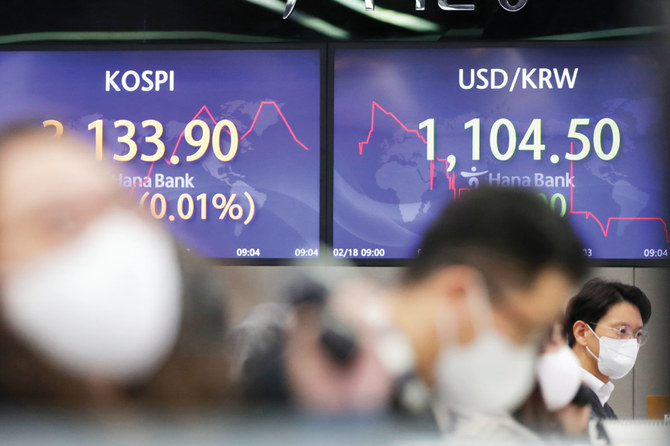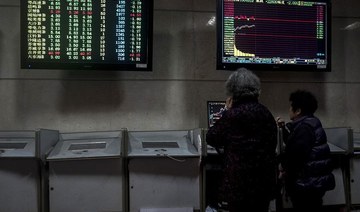LONDON: Asian and European stocks mostly fell Thursday on profit-taking and growing inflation worries, which overshadowed optimism about the expected strong economic recovery, the easing coronavirus crisis and US stimulus hopes.
Oil however barrelled upwards to 13-month highs as the severe cold snap in the US hammers production, trumping news that Saudi Arabia is planning to hike output in light of rising prices.
London stocks shed 0.8 percent and Paris dipped 0.4 percent, while Frankfurt drifted 0.1 percent lower.
Bitcoin meanwhile declined to $51,784, having soared on feverish investor demand late Wednesday to hit a record $52,631.92.
“The quiet atmosphere in European markets has continued,” noted analyst Chris Beauchamp at trading firm IG.
“The generally quieter tone to the week, both on the corporate and earnings front, has generally left investors without much in the way of a catalyst.”
Global equities have enjoyed bumper gains in recent months on mounting confidence that the world economy will rebound from last year’s collapse as COVID-19 vaccination programs allow people to slowly get back to a semblance of normality.
Underpinning that has been vast amounts of government spending as well as ultra-loose central bank monetary policies and pledges of continued support until the recovery is well underway.
At the same time, that has stoked fears over a surge in inflation and produced a spike in US Treasury yields to around one-year highs.
“Strong US economic data dampened the argument that the economy still needs massive stimulus and ... rising inflation expectations start to weigh on valuations,” said OANDA strategist Edward Moya.
In foreign exchange activity on Thursday, the euro sank close to a one-year low against the British pound, which has been boosted by a successful vaccination drive.
The euro slid to 86.65 pence, the lowest level since mid-March 2020.
Asian markets struggled after a mixed showing on Wall Street. Tokyo, Singapore, Seoul, Wellington, Manila, Mumbai and Bangkok all fell, with Hong Kong more than one percent off after a seven-day run-up.
Shanghai rose as it reopened after a week-long holiday, while Taipei and Jakarta also rose and Sydney was barely moved.






















